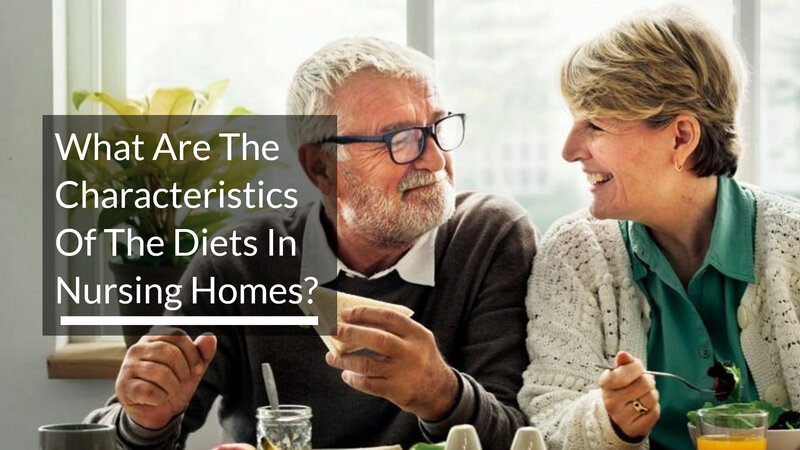What Are The Characteristics Of The Diets In Nursing Homes?
 The elderly need special nutrition in order to stay strong and healthy. Also, it is important that your menus are tailored to your specific needs. Below we will tell you what are the main characteristics of diets in nursing homes from the best professionals in the sector.
The elderly need special nutrition in order to stay strong and healthy. Also, it is important that your menus are tailored to your specific needs. Below we will tell you what are the main characteristics of diets in nursing homes from the best professionals in the sector.
Analysis of diets in nursing homes
The life expectancy of the population has increased greatly in recent decades, but it is undoubtedly essential to guarantee the quality of life of the elderly, and a fundamental aspect to take into account in nursing homes is the adequacy of the diet of the elderly and the elderly to their specific needs.
Older people are especially vulnerable to problems such as malnutrition or poor defenses. The social, physiological and psychological changes that take place during aging largely condition the nutritional status of older people. In this way, it is essential to take care of their diet in nursing homes, also taking into account the pathologies that each elderly person presents.
In this way, nursing home health professionals have the responsibility to adapt their diets in a personalized way to be able to offer them all the nutrients they need to stay healthy. In this area, dieticians and nutritionists will have to abide by the EU regulation 1169 of 2011 of the European Parliament and the Council, which refers to the food information provided to the consumer.
The elderly, or their dependents, will have to have access to the information on the ingredients of all the foods they will consume at the residence. Law 17 of 2011 on Food Safety and Nutrition must also be taken into account, a regulation that reinforces the safety of citizens at the food level, and also promotes healthy eating habits at all ages, in order to prevent diseases.
In the same way, as the professionals have explained to us, whose experience you can contrast by reviewing the different residences offered, in addition to following these regulations, the professionals of the residences must have to take into account.
1.Minimum nutrients
They must ensure the elderly some minimum nutrients that will allow them to cover all their nutritional requirements, as well as compensate and avoid situations of deficit and nutritional deficiencies in the best possible way, also always taking into account the different intolerances, diseases, or disorders suffered by each individual, in order to be able to adapt their diet to the maximum to guarantee the best quality of life for each elderly person.
2. Energy food
At the energy level, it is essential to take into account the amount of physical activity that each elderly person performs, as well as their basal energy expenditure in order to maintain a good energy balance adapted to their specific needs. For example, it will not be the same to adapt the diet to an elderly person who can walk several kilometers every morning than to an elderly person with reduced mobility who cannot move from a chair.
3. Protein foods
In the same way, for the elderly, it is essential to ensure a good intake of protein, in order to minimize muscle reduction, especially for people who have chronic diseases. Experts recommend including about 0.75 grams of protein per kilo of weight per day. If an elderly person has a protein deficiency, their muscle capacity may be reduced, and they will have a much greater chance of falling. In addition, you can also experience skin changes, fatigue, or edema, which can worsen or alter, if this person was healthy, their state of health.
4. Carbohydrates foods
At the carbohydrate level, a contribution of about 100 or 150 grams per day will be enough for the elderly, although it will be important to choose complex carbohydrates and fiber, such as whole grains and vegetables, because with mature age, glucose tolerance is lost. In addition, if there are intolerances, experts recommend avoiding excessive consumption of lactose and sucrose.
5. Monounsaturated fat foods
Regarding fats, experts recommend adding quality monounsaturated fat to the diet of the elderly. As well as some saturated and polyunsaturated fatty acids, but in smaller measures, simply to include variability in the diet.
The diets of the elderly in residences must also guarantee a good supply of essential minerals for the elderly, especially minerals such as iron, zinc and calcium.
6.Vitamins foods
As for vitamins, it is essential to include B vitamins, as well as Vitamin A, vitamin D and vitamin C. Fiber is also important for the elderly, especially to prevent constipation problems. In this case, professionals recommend adding healthy amounts that do not impede the absorption of vitamins and minerals.
In the same way, water is essential, including two and up to three liters a day in the diet of the elderly without problems, since dehydration is another of the most common ills that the elderly usually suffer.
Taking into account these 6 keys, it is possible to establish a healthy diet for nursing homes, always bearing in mind that it should be accompanied by regular physical exercise, always taking into account the health status of each elderly person, as this would bring effects beneficial to the elderly.
In the same way, it is important to bear in mind that, in addition to nutrition to seek the preservation of the health of the elderly and the adaptation of diets to their specific needs, the food in the residence must also be pleasant, entertaining, and serve them stay active and socialize with the rest of the people in the residence.



